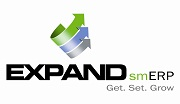 |
| Source : http://bit.ly/2fMfWTy |
However, things are not that
system due to the fact that the pinnacles and pitfalls of both the
architectures are variable and may depend on the company’s size and the industry in which it operates. So, again
the need to be adequately informed of both variants of ERPs need not be
stressed.But on
the whole, Cloud is the direction
software is headed and you will make your business future-proof to a large
extent by opting for cloud ERP Software India too.
Traditional and Cloud ERPs
Traditional ERP systems may be
divided into two different categories viz. the ones which are hosted and the
ones that are present on the premises of the company. In the case of on-premises ERPs, a license to use the software is to be attained and the
software suite is deployed in the data
centers of the business organization. The burden of servicing and maintaining
the installation, in this case, rests on
the shoulders of the business.
Hosted ERPs, on the other hand, provide external management of the ERP. In
usual cases, businesses establish a remote connection to the host of the ERP
through the use of suitable applications. For the service, the business incurs a monthly or annual expenditure. In
this case, the business remains free from
the expenses of dedicated equipment and staff.
Cloud ERPs do have similarities
with the hosted flavor of traditional ERPs but the infrastructure is vastly
different. Cloud ERPs usually make use of the SaaS or Software as a Service
model. The internet is the chosen mode of connectivity. It rarely requires the installation of software and it is independent
of the configuration of the client machine
.
The advantages and disadvantages
of Cloud ERPs
Cloud ERPs are usually less demanding
in terms of operating costs also than traditional ERPs especially on-premises
ERPs which make it attractive for owners of small and medium businesses. Most
hosted solutions too require some or
other form of software which needs to be maintained.
On the flip side, the cost of
cloud ERPs are recurring and there is no room for depreciation like in the case
of ERPs deployed on site.
Another advantage of on-premises
ERPs is that its security is what the business makes out of it. If it keeps its
data centers at the razor’s edge of security techniques,
chances are that it is more secure than most hosted or cloud ERPs. But usually
the security provided by good hosted or cloud ERPs are solid and this rarely
comes into play. But in these days of security breaches,
you can’t play safe enough. Security
usually assumes greater significance in the caseof large corporate organizations.Cloud ERPs are more susceptible
to the problems caused by the nature of the internet like connectivity.

No comments:
Post a Comment
Thank you for your Comments.
ExpandERP Team